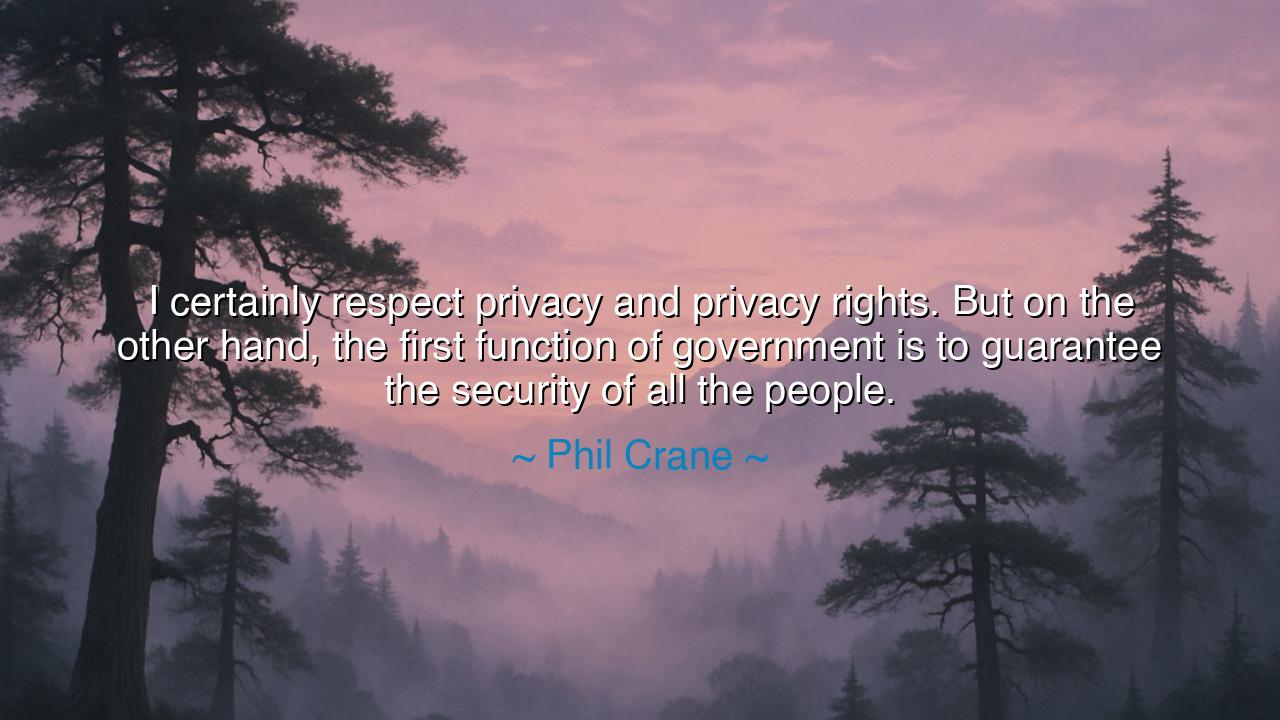
I certainly respect privacy and privacy rights. But on the other
I certainly respect privacy and privacy rights. But on the other hand, the first function of government is to guarantee the security of all the people.






The words of Phil Crane — “I certainly respect privacy and privacy rights. But on the other hand, the first function of government is to guarantee the security of all the people.” — speak to one of the oldest and most delicate balances in the art of governance. These words, though spoken in a modern age, echo through the corridors of time, touching the eternal struggle between freedom and security, between the sanctity of the individual and the strength of the state. Crane, a scholar and statesman, understood that liberty and safety are not enemies but uneasy companions — that to preserve one without losing the other demands wisdom, restraint, and virtue both from rulers and from the ruled.
The origin of this quote rests in the heart of democratic civilization. Phil Crane, a congressman and teacher of history, spoke during an era when new technologies and global threats were reshaping the boundaries of privacy. His words arose from reflection on a truth as ancient as government itself: that no society can endure without protection, yet no protection is noble if it destroys the dignity of the person it seeks to defend. Thus he said — with reverence for privacy but with recognition of security — that the government’s first function must be to keep its people safe, for without safety, freedom itself cannot breathe.
In these words we find a paradox, one that has tested every generation since the dawn of nations. The right to privacy springs from the sacred idea that each soul is its own sanctuary — that there are thoughts, choices, and moments no ruler may rightfully invade. Yet, when danger looms, when enemies gather or chaos spreads, the people look to government as the guardian of their peace. And here lies the test: if the guardian grows too watchful, the walls that protect can become the walls that imprison. To rule well, therefore, is to hold power like a sword wrapped in silk — strong enough to defend, gentle enough to preserve.
History offers a thousand mirrors to this truth. In the days of ancient Rome, when the Republic trembled under the threat of invasion, the Senate appointed a dictator — a temporary ruler granted total power to save the state. Once, it was Cincinnatus, a humble farmer. He left his plow, led the armies to victory, and when the danger had passed, laid down his authority and returned to his fields. His story endures because it shows the ideal balance of power — that the hand entrusted with security must never forget the sanctity of freedom. Yet in later times, when Rome’s rulers failed to surrender that power, when they prized safety above liberty, the Republic died and tyranny was born.
Crane’s warning — though wrapped in respect — is a reminder that security must serve freedom, not replace it. A government that protects all but listens to none may keep its people alive but rob them of their spirit. Likewise, a people who demand absolute privacy without responsibility invite peril, for an unguarded nation is a fragile one. True safety, he implies, is not born of walls and weapons alone, but of trust between the governed and those who govern — a trust forged through transparency, accountability, and a shared commitment to justice.
The lesson of this quote is therefore a lesson of balance — that wisdom lies between extremes. A government must be strong enough to protect, but humble enough to limit itself. It must watch for danger, yet not become danger itself. And the people must cherish privacy, but not use it as a shield for lawlessness or indifference. This balance is not maintained by laws alone but by the moral character of a free society — by citizens who value both liberty and duty, who understand that the shield of freedom must be upheld by hands both clean and vigilant.
So let these words be carried forward as a guide for the ages: Freedom is fragile, and security is sacred. When either is exalted without the other, destruction follows. Let governments remember that their power is a trust, not a possession. Let citizens remember that their privacy is a right, not an excuse for apathy. Between them lies the covenant of civilization — that each will serve the other, neither enslaving nor abandoning.
And when the storms of fear arise, when voices cry for more surveillance or more secrecy, let us recall Phil Crane’s truth: the duty of government begins with protection, but its greatness ends with restraint. The sword must guard the home, but it must never enter it. For only in that sacred balance — between security and liberty, between duty and dignity — can a free people stand firm, unafraid, and worthy of their freedom.






AAdministratorAdministrator
Welcome, honored guests. Please leave a comment, we will respond soon